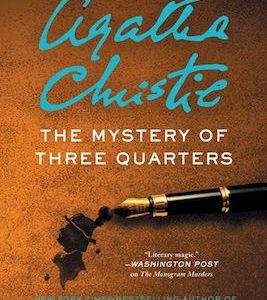I don’t have a good story about the first inappropriate book I read at too young an age. There were so many books around my house from so many genres, I couldn’t even tell you what kind of inappropriate it might have been. It was probably a steamy historical romance, but it could just as easily have been a Stephen King novel or an intense Dean Koontz thriller clutched in my twelve-year-old hands at 1 AM on a school night. My mom loved reading both horror and romance, so I had plenty of access to both and I fell head over heels.
That love forged in childhood has lasted my whole life, and I turned wholeheartedly to suspense and horror for relaxation when I started writing romance. At that point, romance fiction was fraught with all the worries of work and career. Comparison and competition and anxiety that my voice could get muddled by whichever romance author I was reading at the time. It was easier to read a completely different genre, books that were the opposite of love stories.
Judging by the reactions of fellow writers, this isn’t the most common combination of favorites. But it isn’t strange to me. When I’m reading, I want to be deep in a protagonist’s point of view, on a roller coaster ride of intense feeling. I guess what I want to read is excitement of one kind or another, and I know where to get it.
Love stories and scary stories are opposites for a reason: they’re flip sides of the same coin. They each tap into the most basic of human drives: to survive and to mate.A few years ago I had coffee with Daniel Kraus (The Shape of Water) at Book Expo America and was surprised to discover that he had similar genre tastes. We’d both spent our early years reading romances while also hunting down the scariest books we could find. A kindred spirit! I came away from that conversation with the realization that love stories and scary stories are opposites for a reason: they’re flip sides of the same coin. They each tap into the most basic of human drives: to survive and to mate. Most of our energy as a species goes into finding food, shelter, safety and companionship. Stay alive and pair up. That’s the directive. It only makes sense that these are the stories that would evoke the most visceral responses in readers.
The best of these books use deep characterization to pull the reader in. They have to. Everyone wants to survive and everyone wants to find love. There’s no surprise to be found in motivation. The surprise is in the character, how they respond, what they feel, what they reveal and what they hold close. It’s genre, after all. We usually know the ending. It’s the perilous journey we crave, whether the risk is to heart or body.
So I spent many happy years writing about love and reading about fear, and I never considered changing anything. I wrote historical romance, paranormal romance, contemporary romance, erotic romance… I embraced so many subgenres of love stories. Frankly, I didn’t have time to even consider stepping outside the genre to write something completely different. My plate was full. Romance readers are voracious and we always want more more more.
Then my editor, Tara Parsons, moved to a non-romance imprint and asked if I’d try my hand at something different. I said no. She asked again. I said no. A few years and a few more requests later, instead of saying no, I considered the prospect. I trusted Tara completely. I loved the idea of working with her again. If I wanted to write something darker—and that was a big IF—could I? Would I?
If the world had stayed its course, I’d likely have stayed mine. But things have gone a little mad ‘round here and I was feeling a little mad myself. Writing love stories had suddenly become difficult. I didn’t feel hopeful when I woke up in the morning; I felt dark. Scared. Angry. I so admire all the women I know who are fighting through their fear to keep creating love stories for readers who desperately need them right now. But I stared at my blank pages and could only type out a few half-hearted pitches for a new romance trilogy. I dreaded the idea of actually writing the books. The flip side of that coin was calling to me… so I finally answered.
The idea for my first suspense story came in fits and starts, and I was desperately afraid I wouldn’t be able to find my footing in a new genre. I knew my voice in romance, but did I have anything to say in suspense? It turned out that there were a lot of words bottled up inside me. When I started to write suspense, I felt free.
Not free from romance. Not free from a constriction. All genres have boundaries. That’s how genre works. But if the rules of a genre are walls around a glorious garden, I felt I’d walked every inch of romance and fiddled with each loose brick I could find in those walls. Suspense meant stepping into an unexplored landscape and mapping those new boundaries myself. And god, it was exciting.
I’ve written so-called unsympathetic heroines for years, but now I could really get into the bones of it. I could take my female protagonists deep and dark and not let them come up for air. I wrote my protagonist into bad decisions and pointed her toward terrible choices, and none of her transgressions had to be forgivable, they just had to move the story forward.
This feels like the greatest difference between writing suspense and writing romance: the boundaries of behavior.This feels like the greatest difference between writing suspense and writing romance: the boundaries of behavior. The main characters in romance novels can make mistakes—in fact they have to make mistakes. A love story requires big obstacles to love or there is no journey, nor is there enough friction to create heat. But in romance, those mistakes must be fixable and, more importantly, they must be forgivable. The satisfying end of the story means putting a vulnerable heart into those hands and trusting it will be safe.
But when I started writing suspense, I could let my protagonist do anything. She could be snide or full of rage or even terribly weak. She could fall for the wrong guy. Cheat on her cheating husband. Stalk a rival. Lie to the police. Have a nervous breakdown. Because this story wasn’t about bonding with another human being. This story was about survival. And we all have the right to kick and scratch and bite when we’re on the way down. We all have the right to claw our way back to the surface.
I’ve loved being able to stretch out and explore the darker edges of human behavior. In fact, maybe I’ve loved it too much. My current release is Jane Doe, and I went a little wild exploring boundaries in this one. You see, Jane is a sociopath, so she not only has no need for forgiveness, she has no forgiveness for others either.
I went as deep and dark as I could with this book. And it’s told from the first person point of view, so there’s no escaping Jane’s more frightening thoughts. But the funny thing is… being freed from the walls of likeability and normal behavior let me feel I could pull a bit more romance into this book. The suspense genre has walls too, and the more familiar I become with this genre, the more I’m looking for loose bricks, pushing the edges, bringing in a little more sex and love.
Because these genres are flip sides of the same coin, you see, and they complement each other. My favorite romances involve some danger. A struggle for survival. A villain who puts the couple’s future happiness at risk or a battle that could tear them apart. If you haven’t tried Kit Rocha’s futuristic dystopian romances, check them out. Or try Alyssa Cole’s An Extraordinary Union, a romance between two spies during the Civil War. Plenty of danger to add higher stakes to the romance.
And my favorite suspense stories tug at the heart. The bonds between characters help us invest more in the protagonist’s safety and struggle. We need them to survive because they love and are loved. We feel their fear of losing everything and their awful vulnerability. Most of the urgency of Blake Crouch’s Dark Matter centers on him returning to his wife and child. Getting back to that love. He can physically survive in another dimension, but he’ll lose the love of his life. And all the terror facing the heroine of Rachel Caine’s Stillhouse Lake is amplified by the possibility of new passion and new betrayal with a mysterious man. A danger to her heart as well as her life.
Stay alive and pair up. These are our most basic human needs, and I think they’re the most important stories we tell, which is why they go together so well. I’m thrilled I’ve had a chance to try my hand at writing both.

















